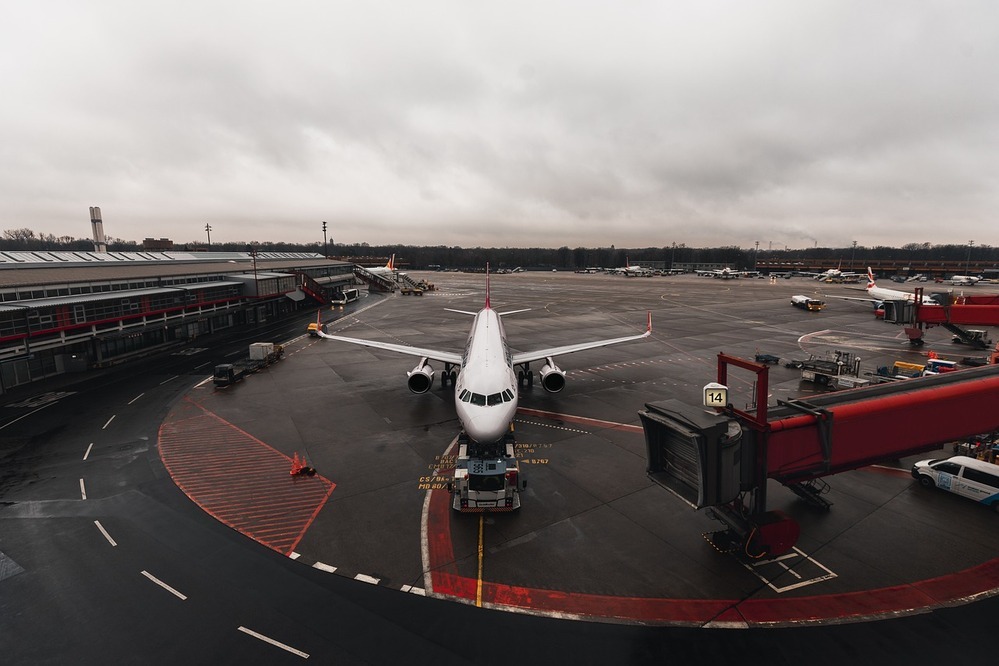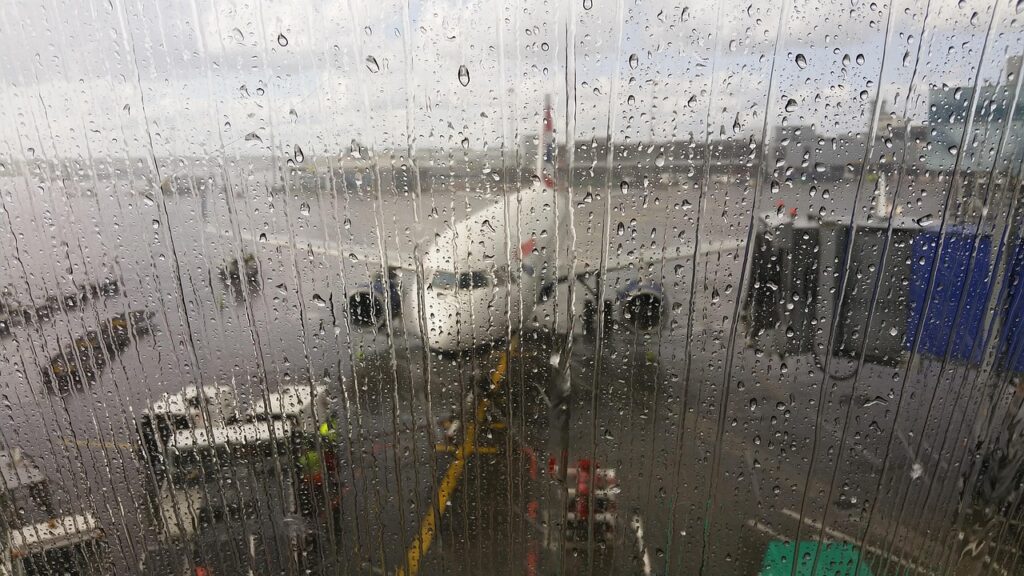Staring out at a downpour on your way to the airport and wondering—will my flight take off? You’re not alone. While rain itself doesn’t usually ground planes, it can still play a sneaky role in delaying your journey.
Modern aircraft are built to fly through storms, but what happens on the ground—like poor visibility or slick runways—can change the game. In this guide, we’ll break down when rain really causes delays, what weather conditions airlines watch for, and what rights you have if you’re stuck waiting for the skies to clear.
How Does Rain Delay Flights? Landing and Takeoff in Rainy Weather

As mentioned in the introduction, modern airplanes are designed to remain safe during heavy rainfall and can even take off and land in such conditions. Additionally, airports also feature well-designed drainage systems that help keep runways free of water logging, making taking off and landing more manageable.
However, there are a few factors that can affect an airplane’s ability to take off or land safely during such conditions. These include:
- Turbulence: Heavy rains can often be accompanied by strong winds which can lead to turbulence. Most pilots are trained to manage this, but it can make the process uncomfortable for the passengers on board.
- Visibility: Visibility is key to safe take-offs and landings. Heavy rains can often lead to a significant drop in visibility, which can cause delays or cancellations in certain extreme conditions.
- Ground Operations: Rains can make runways slippery. This situation demands extra caution from pilots, and can also lead to slower taxi speeds, congestion at the airport, and certain adjustments in the take-off procedure to ensure operational safety.
- Aerodynamics: Heavy rain can at times affect lift due to water accumulation in the wings, but this typically only happens during icing conditions or heavy thunderstorms.
- Flight Performance: While heavy rain doesn’t typically affect lift or engine performance, the increased drag can lead to greater fuel consumption. However, it doesn’t typically result in delays or cancellations.
Tip: If you’re worried about a delay, check your airport’s real-time weather conditions and flight tracking tools (such as FlightAware or FlightRadar24) to get a sense of potential disruptions.
In Which Rain Conditions Can Flights Still Operate?
Typically, flights are not canceled merely due to heavy rainfall. This is because airplanes have been designed and pilots have been trained to handle such wet conditions safely. Light rain does not affect flight operations whatsoever. The thresholds established for operational safety and visibility are well established and as long as the conditions are within these parameters, you will not encounter any delays.
However, heavier rain that leads to unsafe visibility levels, along with other elements such as snow, thunderstorms, ice, and so on, can result in flights being delayed until the conditions improve. Sometimes, the presence of a thunderstorm and heavy winds caused by hurricanes or tornadoes can even lead to flights being canceled.
Air traffic control centers also analyze weather patterns along key routes to find alternatives and to decide whether flights on a particular route need to be canceled or delayed. However, most examples of rain will show you that this weather condition alone will rarely ever lead to a delay or cancellation.
Do Planes Get Delayed Due to Rain?

Do Planes Get Delayed Due to Rain? As mentioned above, rain will typically have to be accompanied by other elements such as heavy winds or thunderstorms for your flight to be delayed. Through my research on flight cancellations due to thunderstorms, I’ve found that these severe weather combinations pose the greatest risk to aviation safety. However, the eventual decision will also depend on the degree of rain in the area. Additionally, the slippery conditions caused by the rain can lead to delays due to slower taxi speeds and congestion at the airport. These delays can particularly be a challenge at busier airports.
Sometimes, heavy rain and any resulting lower visibility at the destination can also lead to flights being diverted to other airports, which can further cascade delays. So, do flights get delayed because of rain? When accompanied by other factors that can affect safety and visibility, the answer is yes.
What is the Airline’s Policy on Rain-Related Delays?
Most flight cancellations occur due to changes in weather conditions. In most cases of non-weather-related delays and cancellations, airlines in Europe are required to compensate passengers if the delay exceeds three hours.
However, heavy rains and other extreme weather conditions such as thunderstorms or hurricanes are out of the airline’s control. This exempts airlines from having to compensate passengers for any delays or cancellations caused as a result.
However, keep in mind that airlines may sometimes use inclement weather as an excuse when flights are delayed due to other reasons within the airline’s control. In recent years, airlines have also used the lack of de-icing fluid as a reason for delaying or calling flights. However, you should be aware that airlines can be held liable for failing to ensure the presence of de-icing fluid to defrost their aircraft.
Additionally, the ECJ ruling of 11 June 2020 (Case C-74/19) states that airlines must prove that they took every possible measure to re-route passengers at the earliest available opportunity. This is particular in situations where flights have been delayed or canceled due to “extraordinary circumstances.”
US Policy For Delays Due to Rain
According to the US Department for Transportation, if your flight has been delayed due to local weather or air traffic control, chances are all flights will be delayed and there isn’t much your airline will be able to do in such a situation.
However, if you experience a lengthy delay, you’ll be better off trying to arrange an alternative flight for yourself, provided you don’t have to pay a cancellation fee. If you find a flight on another airline, you can also ask your airline if it will endorse your ticket with the new carrier. However, there is no law requiring them to do this.
If your flight has been canceled, most airlines will rebook you on the next available flight at no extra charge. Each airline has its own policies on how they handle delays.
EU Policy For Delays Due to Rain
Delays and cancellations of flights in the EU are governed by EU Regulation 261/2004. While EU Regulation 261/2004 entitles passengers to compensation if their flight is delayed by over three hours, it has certain exceptions to this rule. One of these exceptions is adverse or severe weather. These are considered an “act of God” and are out of the airline’s control. As a result, if your flight has been canceled due to a thunderstorm, cyclone, or really strong winds, you may not be entitled to compensation.
However, as stated earlier, rain is typically not enough to lead to a significant delay. Besides those caused by slower taxiing speeds and the slippery conditions. But when rain is accompanied by other natural forces that make taking off unsafe, your flight could be canceled.
Keep in mind that airlines sometimes use adverse weather as an excuse for not compensating passengers for delays. So, if you find that yours is the only flight delayed due to “adverse weather” while others remain operational, you can file for compensation and present all possible evidence.
💡 What to Do If Your Flight is Delayed Due to Rain
✔️ Check Your Flight Status – Use the airline’s app or website for real-time updates.
✔️ Sign Up for Alerts – Some airlines send delay/cancellation notifications via SMS or email.
✔️ Ask About Rebooking – If your flight is significantly delayed, request an alternative route.
✔️ Know Your Rights – While weather delays aren’t compensated, you may be entitled to meals, hotel stays, or alternative travel options.
✔️ Use Lounge Access if Possible – Some credit cards or frequent flyer programs offer access to lounges where you can wait more comfortably.
✔️ Prepare for Overnight Delays – If the delay turns into an overnight wait, ask the airline if they will cover hotel expenses.
How Rain Affects Flights – Quick Guide
| Factor | Impact on Flights |
| Light Rain | No impact; flights operate normally |
| Moderate Rain | Slight delays possible due to reduced visibility or runway conditions |
| Heavy Rain | May cause slower taxi speeds, congestion, and minor delays |
| Rain + Thunderstorm | Can lead to significant delays or cancellations |
| Rain + Strong Winds | Possible diversions, longer flight routes, or cancellations |
| Rain + Poor Visibility | May delay landings and takeoffs for safety reasons |
| Compensation Eligibility | Weather-related delays are not eligible for compensation under EU261 or U.S. DOT policies |
While rain alone rarely cancels flights, it can lead to delays if combined with strong winds, storms, or poor visibility. Check real-time flight status and airline policies for possible rebooking options.
FAQ
Yes, passenger aircraft are engineered to be able to handle weather conditions like heavy rain. However, rains can delay flights if they are accompanied by a storm or extremely poor visibility.
No, flights don’t get delayed because of rain. The only scenario in which you could experience a delay during heavy rain is when the runways are slippery, the taxi speeds are slow, or there is a lot of congestion. However, from an engineering perspective, aircraft are designed to withstand heavy rain.
There is no fixed time for which rain typically delays flights, as this is entirely up to the ways of nature. However, in most cases, rain alone will not lead to your flight being delayed unless it is accompanied by poor visibility, thunderstorms, or excessively strong winds.
